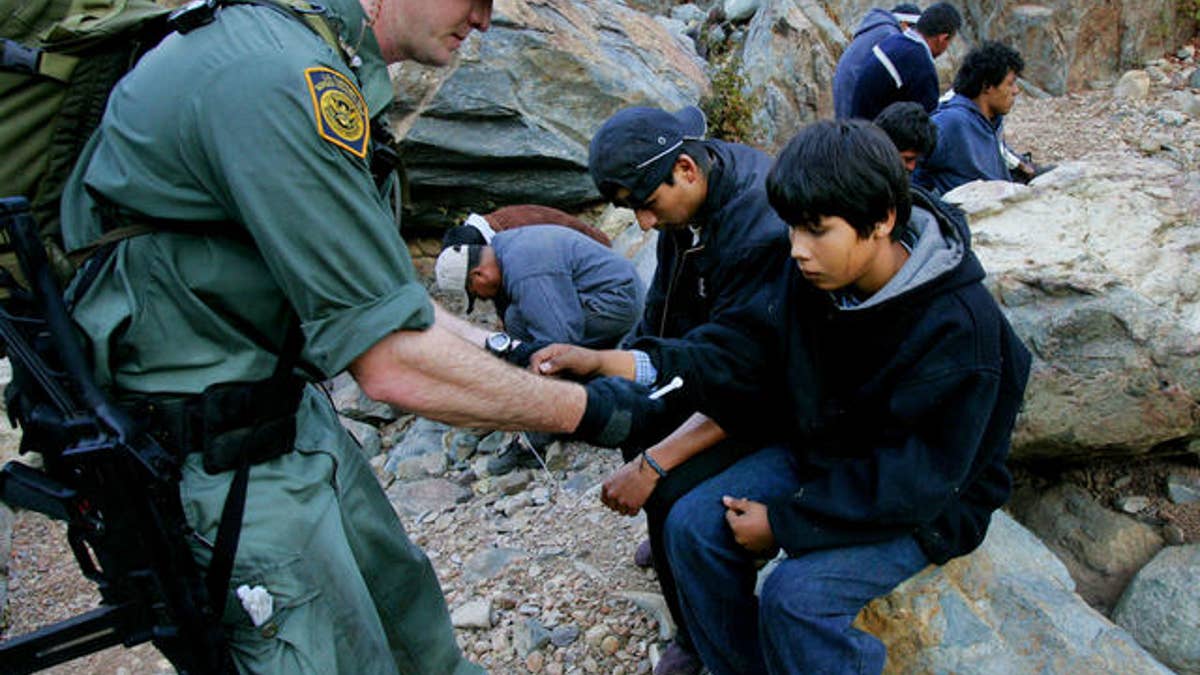
Border patrol agent Jeff Mielke secures plastic handcuffs on a group of undocumented immigrants caught in the Otay Mesa Mountain Range, just east of San Diego. (AP)
A day after the Obama Administration announced the most sweeping change to the way the United States deports immigrants, reactions on different sides of the immigration debate ranged from lavish praise to predictions of doom.
The administration – under attack by immigration advocates for having a record number of deportations under its watch – said that it would suspend deportations while it reviewed each case and proceeded with those it considered high priority.
Immigration advocates generally welcomed the news.
“The Obama Administration responded to the call for administrative action with significant changes that, if implemented fully and fairly, will focus immigration enforcement on the worst of the worst, not the best and the brightest,” said Frank Sharry, executive director of America’s Voice Education Fund, which favors more leniency in immigration policies.
“This new approach is firmly grounded in principles of smart law enforcement, putting the deportation of dangerous felons ahead of young people eligible for the DREAM Act and other immigrants who have been in the country for years, raising families and building up significant equities.”
Rep. Zoe Lofgren, a California Democrat, and former chairwoman of the House immigration subcommittee, called the new approach a step toward more a prudent use of resources.
“The changes outlined in today’s announcement,” Lofgren said, “ should further help ensure that the country’s enforcement resources are focused on those who would do us harm, rather than students, nursing mothers, or family members of U.S. soldiers who put their lives on the line for our country.”
Proponents of strict immigration enforcement, however, say that the White House’s new handling of deportations amounts to rewarding people who flout immigration laws.
“The Obama administration cannot get its amnesty schemes through Congress, so now it has resorted to implementing its plans via executive fiat,” said Arizona Gov. Jan Brewer, who signed into law an immigration measure last year that makes it a crime to be in the state illegally. “With this announcement, the President is encouraging more illegal immigration at the exact moment we need federal focus on border security.”
Brewer added that Obama was contradicting itself; she said that in July, during a speech at a gathering of the National Council of La Raza, the president said he could not bypass Congress and unilaterally make major changes to immigration policy.
“President Obama got it right last month,” Brewer said, “and got it really wrong today.”
“We need to remind President Obama that we elected a president that serves beneath the law,” Brewer said, “and did not anoint a king that is above the law.”
The Federation for American Immigration, or FAIR, which favors strict immigration enforcement, called the new policy “administrative amnesty.”
Dan Stein, FAIR’s president, said that the policy “clearly demonstrates the Obama Administration’s defiance of both the constitutional separation of powers and the will of the American public in its relentless effort to gain amnesty for illegal aliens.”
Other reactions, mainly from Latino groups and immigration advocacy organizations, fell between praise and condemnation.
Many expressed cautious optimism, at best, and skepticism, at worst, citing a recent notification by immigration officials that went out to political officials nationwide saying that a controversial enforcement program known as Secure Communities would no longer adhere to negotiated agreements, and that the federal government would implement it as it pleased.
The program, which is billed as having criminals as its highest priority, drew the ire of immigration advocates who said it too often ensnared people with immigration violations – which are civil – but no criminal records.
“Not enough,” said a statement by Rev. Miguel Rivera -- head of the National Coalition of Latino Clergy and Christian Leaders, or CONLAMIC, which has a 24,000 member churches nationwide – about the new deportation policy.
“Every Latino detained due to the atrocities of discrimination against Latino immigrants during the enforcement of the law [Secure Communities], should be freed immediately.”
Others who want the Obama Administration to make deeper changes in immigration said that the White House deserved credit for taking such an unprecedented step toward prioritizing who gets deported.
Sen. Robert Menendez, a New Jersey Democrat who has been one of Congress’s most persistent advocates for comprehensive immigration reform – including an end to the deportation of undocumented immigrants who were brought to the United States as children by their parents – called the announcement “a positive step forward.”
“I hope [the Department of Homeland Security] will pursue additional initiatives to keep American families together.”
Former immigration commissioner Doris Meissner called Obama’s move a dramatic, unprecedented overhaul in immigration enforcement.
Meissner, who served under President Bill Clinton, disputed the notion that the temporary suspension of deportations was a form of amnesty.




